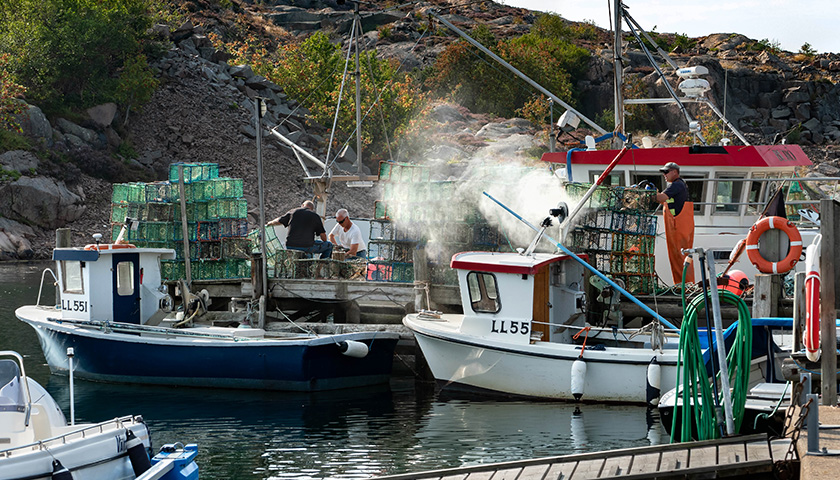Maine fisherman Jason Lorde joined a chorus of others who are denouncing a decision by upscale supermarket chain Whole Foods to stop purchasing Maine lobsters for its stores due to environmentalist pleas for the safety of the rare right whale, a move that affects the livelihood of hundreds of lobstermen.
The decision by Whole Foods has sparked outcry toward what many are describing as an example of environmental extremism.
Lorde, who appeared on Fox News’ Jesse Watters Primetime on Monday, condemned the move by Whole Foods to stop buying lobsters caught off the coast of the Gulf of Maine due to a fisheries suspension by the Marine Stewardship Council over fear that the right whale could potentially become entangled in fishing gear.
“I think Whole Foods maybe should have done a little more homework,” Lorde said. “We have been in business for over 150 years, and we have done our due diligence. We were conservationists before conservationist was cool. I’m sorry they felt they had to jump on the bandwagon with all the rest of the West Coasters.”
In addition to the Marine Stewardship Council’s suspension, environmental group Monterey Bay Aquarium (MBA) Seafood Watch recently pulled its lobster endorsements over the same concern.
Lorde said there had not been a single episode of a right whale becoming entangled in fishing gear in Maine, which has had the largest lobster fishing industry in the nation for over 150 years.
“Don’t believe everything you read on social media,” he said. “I think it’s an avenue for misconstrued deception, and if anyone wants to get the real deal, hop aboard. We’ll take you and show you what’s really happening.”
According to Fox 22 Bangor, the statement from Whole Foods Market Spokesperson Nathan Cimbala read:
[T]hese third-party verifications and ratings are critical to maintaining the integrity of our standards for all wild-caught seafood found in our seafood department. We are closely monitoring this situation and are committed to working with suppliers, fisheries, and environmental advocacy groups as it develops.
With its announcement, Whole Foods, owned by Amazon, has drawn fire from Maine politicians and lobstermen.
Maine Gov. Janet Mills (D) joined with the state’s congressional delegation, Sens. Susan Collins (R) and Angus King (I), and Reps. Chellie Pingree (D) and Jared Golden (D), in a response to the announcement:
We are disappointed by Whole Foods’ decision and deeply frustrated that the Marine Stewardship Council’s suspension of the lobster industry’s certificate of sustainability continues to harm the livelihoods of hardworking men and women up and down Maine’s coast. In an appeal to retailers just weeks ago, we outlined the facts: there has never been a right whale death attributed to Maine lobster gear; Maine lobstermen have a 150-year history of sustainability; and Maine’s lobstering community has consistently demonstrated their commitment to protecting right whales. Despite this, the Marine Stewardship Council, with retailers following suit, wrongly and blindly decided to follow the recommendations of misguided environmental groups rather than science. We strongly urge the Marine Stewardship Council and retailers to reconsider their potentially devastating decisions.
In a blistering op-ed Tuesday at the Press Herald, Maine resident Robert Charles, a former assistant secretary of state under Colin Powell and a former Reagan and Bush 41 White House staffer, described the move by Whole Foods as “an apparent attempt to shame Maine lobster fishermen into giving up their livelihoods.”
Acknowledging that the right whales “deserve our respect,” Charles asserted nevertheless:
That said, suspending an entire industry, lobster fishing in Maine – which generates $725 million a year for those who fish, build and maintain boats, traps, transport, and store lobsters – is wrong. The idea is already generating bipartisan condemnation.
“Lobstering to Maine is like oilfields to Texas, farming to North Dakota, government to Washington D.C. – a staple of the economy, how many eke out a living,” Charles continued. “As a Colby study noted, ‘Maine’s iconic lobster industry is … perhaps the most economically important asset in the state,’ directly affecting tourism.”
Observing the numerous restrictions already placed on lobstermen, Charles wrote the “bottom line” is that “environmental regulation has its place to preserve sustainable stock and protect endangered species, but reason is essential.”
“Lobsters will continue to be caught and sold to those who understand life’s balance,” he noted. “Time for big companies and government to think with the people, not against them.”
– – –
Susan Berry, PhD, is national education editor at The Star News Network. Email tips to [email protected].
Photo “Lobster Fishermen” by W.carter. CC0 1.0.




